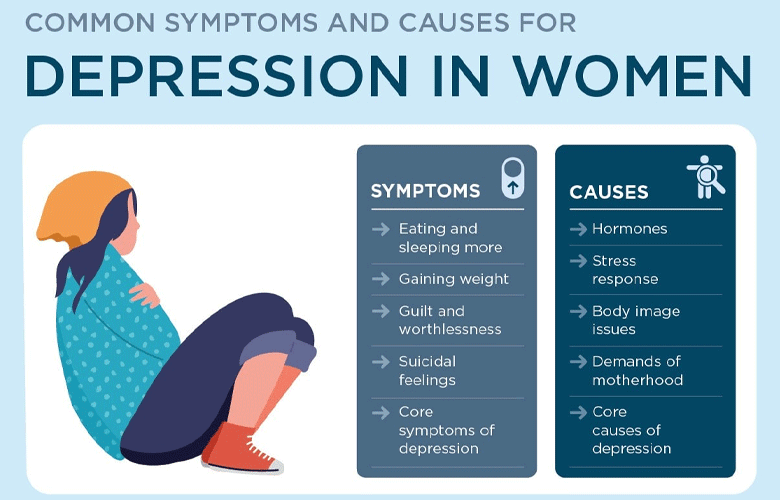Depression is a mental health condition that can affect anyone, but it is more common in women than men. According to the World Health Organization (WHO), depression affects approximately 264 million people worldwide, with women being twice as likely to be diagnosed with the condition than men.
Symptoms of Depression in Women:
- Persistent sadness, anxiety, or feelings of emptiness: Women with depression often feel a sense of hopelessness, despair, or emptiness that doesn’t go away.
- Loss of interest or pleasure in activities once enjoyed: Women with depression may lose interest in things they once enjoyed, such as hobbies, socializing, or spending time with family and friends.
- Changes in appetite or weight: Women with depression may experience changes in their appetite, leading to weight gain or loss.
- Sleep disturbances, such as insomnia or oversleeping: Women with depression may have trouble falling or staying asleep, or they may sleep too much.
- Fatigue or loss of energy: Women with depression often feel tired or have low energy, even if they haven’t done anything physically taxing.
- Difficulty concentrating or making decisions: Women with depression may have trouble concentrating, remembering things, or making decisions.
- Feelings of worthlessness or guilt: Women with depression may feel guilty about things that aren’t their fault, or they may feel worthless or like they don’t deserve happiness.
- Physical symptoms, such as headaches or stomach problems: Women with depression may experience physical symptoms such as headaches, stomach problems, or other aches and pains.
- Thoughts of death or suicide: Women with depression may have thoughts of death or suicide, and they may talk about or plan suicide.
Causes of Depression in Women:
- Hormonal changes: Women go through hormonal changes throughout their lives, including during puberty, menstruation, pregnancy, and menopause. These changes can affect mood and contribute to depression.
- Genetics: Depression can run in families, suggesting a genetic predisposition to the condition.
- Life events: Traumatic or stressful life events, such as the death of a loved one, divorce, or financial difficulties, can trigger depression in women.
- Biological differences: Women’s brains are wired differently than men’s, and they may have different responses to stress, which can increase the risk of depression.
- Social and cultural factors: Women are more likely than men to experience social isolation, discrimination, and gender-based violence, which can contribute to depression.
- Mental health conditions: Women are more likely to have anxiety disorders and eating disorders, which are risk factors for depression.
Treatment for Depression in Women:
Depression is a treatable condition, and there are several treatment options available. These include:
- Psychotherapy: Psychotherapy, or talk therapy, can help women with depression learn coping strategies, change negative thought patterns, and develop healthier behaviors.
- Medication: Antidepressant medications can help relieve symptoms of depression by changing brain chemistry.
- Lifestyle changes: Lifestyle changes such as regular exercise, a healthy diet, and getting enough sleep can help improve mood and reduce symptoms of depression.
- Support groups: Joining a support group can help women with depression connect with others who are going through similar experiences and provide emotional support.
- Alternative therapies: Alternative therapies such as yoga, meditation, and acupuncture can help reduce symptoms of depression in some women.
In conclusion, depression is a common mental health condition that affects millions of women worldwide. Symptoms of depression include persistent sadness, loss of interest in activities, changes in appetite or sleep patterns, and thoughts of death or suicide. Causes of depression in women can include hormonal changes, genetics, life events, biological differences, social and cultural factors, and mental health conditions. Treatment for depression in women includes psycho.
